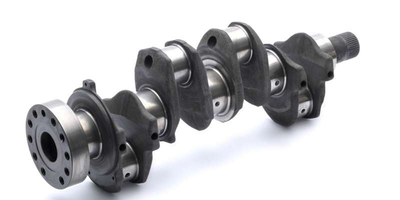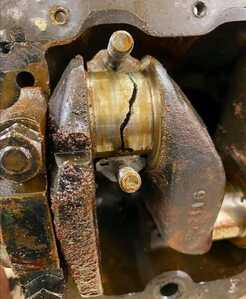
What to do if your engine is making a knocking sound
As soon as you notice a knocking sound, you should stop driving and park in a safe location.
Investigate the issue yourself by checking your engine oil and checking any warning lights, reading your owner’s manual for instructions. For the most accurate diagnosis and repairs, you should always consult a mechanic.
How to prevent engine knocking
To help prevent knocking or pinging noises from your engine, it's crucial to follow the recommended preventative maintenance schedule. This includes:
Changing the engine oil and using the correct viscosity/grade per the owner's manual intervals
Replacing Oil filters, Pistons, Piston Rings etc. on schedule
Addressing any fluid leaks promptly to maintain proper lubrication levels
Using high-quality Engine Oil and considering periodic Oil system cleaners
Keeping up with all other scheduled maintenance for emissions
Sticking to the manufacturer's guidance for maintenance using approved fluids and parts allows components to operate properly, reducing the strain that leads to knocking noises. Consistent care is key to preventing costly engine damage down the road.
While some cases of engine knocking can’t be avoided, it’s best to stay on top of a preventative maintenance schedule to decrease your chances.
10 REASONS WHY YOUR CAR ENGINE IS KNOCKING
A knocking sound coming from your engine can ring alarm bells but isn’t always as serious as you think. However, if you do hear your engine knocking, it’s important to address the issue as soon as possible to prevent further damage and breakdowns.
In this article, we’ll cover what causes a knock in the engine, with six common reasons. We’ll also look at how to identify the source of the issue to help you determine the best course of action.
1.Low oil pressure(oil pump)
Engine oil is a vital lubricant that keeps your motor running smoothly. Without it the engine will seize and the internal components of your engine can ‘knock’ against each other, which can lead to serious damage in the long term.
If the engine oil level is too low, the oil pump picks up air instead of oil, and air does not provide the lubrication needed to protect the moving parts of an engine. Knocking happens as a result of the bearings getting starved of oil, and they begin to melt from the heat of friction.
If your oil pressure is low, you may also have a leak. Try checking your oil and topping up if necessary. If you find it running low again quickly, this indicates a leak in the system, and you should contact a mechanic to organize a repair.
2. Valve lifter failure
A valve lifter is another essential engine component that transfers motion to open and close the valves. If your oil hasn’t been changed in a while, dirt can accumulate in the lifters, leading to a persistent knocking noise every time you start the engine. Lifters can also become clogged when you use the incorrect grade of oil for your engine.
Changing your oil and running a cleaning agent through the engine could be the simple solution to your engine knocking sound. Your vehicle’s handbook will give guidance as to how often oil will need changing for your particular vehicle and also the type of oil to use.
3.Worn engine bearings
Engine bearings are there to reduce friction while supporting moving machinery. They facilitate the smooth movement of the pistons as they travel up and down in the engine, turning the crankshaft which transfers power to the wheels.
Over time, they can become worn out or come out of position, creating a rattling noise as the pistons clunk against the crankshaft.
If this is the cause of your engine knocking sound, you’ll need to book in for a repair with a qualified mechanic.
4.Rod bearings
Rod bearings maintain the clearance between the connecting rods and the crankshaft, allowing oil to pass through and preventing metal-on-metal grinding. If the clearance increases, the metal may clatter together, causing a knocking noise. This can be caused by low oil levels, low-quality oil, or going too long between oil changes
5.Connecting rods
If the connecting rods are damaged or loose, it can cause a knocking noise. This can be caused by insufficient lubrication or repeated detonation events, also known as pre-ignition.
6.Bent camshaft or crankshaft.
If the cam shaft is bent then you're lifters are knocking against the piston which puts holes, breaks the valves or bends the lifters out of whack. If the crankshaft is bent then likely your pistons have developed a bent rod and are tapping against the cylinder wall during a cycle. Engines doomed.
7.Timing is thrown out.
You're in luck get a mechanic to check the timing assembly because there's more than 1 issue present than just a misaligned chain and gears, bearings, gear teeth and the cams need to be checked for trueness these aren't things a diyer can do. But if camshaft is bent you're still s.o.l.
8.Cylinder
Cylinder walls are badly scored and catching the pistons creating horrid noise. The piston rings got burned and stuck which is what causes the immense scoring on the interior liner of the cylinder. If you caught this in time chances are with the right additive to the engine oil you could free the rings and they may work as intended or not. Likely the engine is done for.
9.Then there’s tappet click and clack.
If you have an adjustable valve train, you can fix that by adjusting the valves. Most cars these days have self-adjusting hydraulic valve lifters. They can get gummed up so they tick and tap when the engine’s cold. Usually when it warms up they quiet down. If the noise comes and goes, you probably have an intermittently stuck lifter. If the noise goes away when you goose the engine a bit, it’s probably a lifter. If your oil is real scummy and gummy, an oil change might help that. Also there are magical mystery sauces you can get at your auto parts store if your oil change doesn’t fix it.
10.There could be a number of reasons for a sudden onset of knocking after an oil change. One could be that the wrong viscosity or spec. oil was used. Another reason could be that the oil filter collapsed, or if a cartridge type filter, it was put in backwards. This could reduce your oil pressure to the point it causes knocking. The most nefarious reason is that during the last oil change someone added something to mask a knocking condition. When the oil was changed, the additive was drained and the knocking started again. This is sometimes seen when someone is trying to unload a defective vehicle on an unsuspecting buyer. Best to have a competent mechanic diagnose the reason for the knocking.
Can I drive with an engine knocking sound?
While some of the reasons behind an engine knocking noise are relatively simple to remedy, you shouldn’t drive your car until the issue has been diagnosed and resolved.
Continuing to drive can cause further damage to your car. If your engine fails on the road, you could even end up in an accident.
At the very least, you may find yourself with a more expensive repair bill as the fault continues to wreak havoc beneath your bonnet.
Next topic
2.HOW DOES THE ENGINE LUBRICATION SYSTEM WORK?

